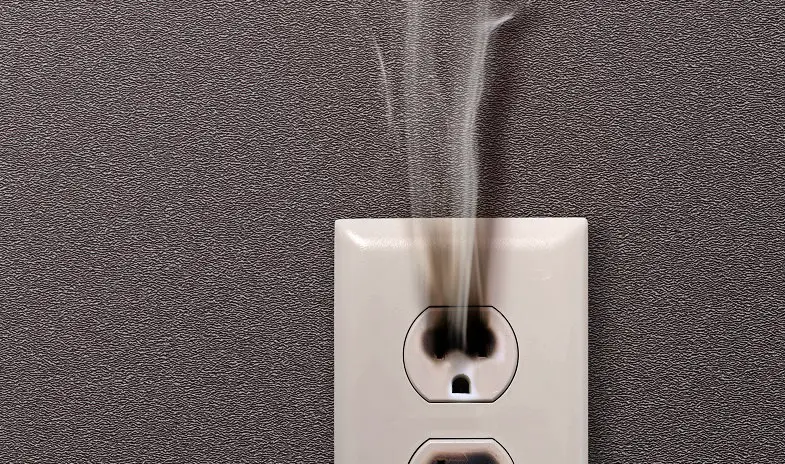Air ionizers, sometimes called negative ion generators, are a type of air purifier whose goal is to make the air in your room completely clean and remove all harmful particles in the air. Consequently, one common question is if air ionizers produce any smell, and if so why? If you never had an air ionizer device before and did a bit of digging around you might have stumbled upon various forum threads in which people share their experiences , which differ quite a bit.
The most accurate answer is this: the only real “smell” you should sense after using an air ionizer is best described as a smell of freshness – similar to the smell of air before thunder hits or after a thunderstorm. Why? In most simple terms – since negative ions remove even the smallest particles, they also remove any odor or smells. If we remove all odors and other harmful particles from the air, then nothing remains except clean and pure air.

We can almost smell this picture, can you?
Air ionizers and electric smell
At some point, you might have had or read about a completely different experience than what we described in the paragraph above. Sometimes people report of air ionizers having a very distinct electric smell. Other words that people use to describe this smell are: burnt electronics, electric spark, chlorine, and a burning wire. Why does this happen? This happens because many air ionizers emit ozone as a sideproduct, which gives it this distinct smell. This is most common for air ionizers that use a metal needle as the element of ionization. A metal needle will oxidize with time, releasing ozone in the process.

Typical ozone smell description in one photo, not very pleasant.
Ozone is a great thing when we are talking about it in the atmosphere. Up there ozone protects us from harmful UV rays. However, it is quite harmful for us (more specifically our lungs) if we are indirectly exposed to it. If you keep smelling the above-mentioned smells you can be sure that your air ionizer is emitting ozone. If you are asthmatic, have children or vitamin C & E deficiencies, you have to be especially more careful because you can develop health problems from ozone even more easily.
Although the smell is usually all it takes to identify ozone, people can develop certain symptoms as well. These are coughing, tight feeling in the chest, throat irritation, wheezing and shortness of breath.
How to choose an air ionizer that will not smell?
Up to now, you have learned what an air ionizer smell should look like and what is the actual (opposite experience) of many people. So, how do you go from here? First, you have to know the difference between an air ionizer, air purifier, and ozone generator. Seriously, many people mix these up. The main thing you have to know is all air ionizers are air purifiers, but not all air purifiers are necessarily air ionizers. Also, air ionizers are not the same as ozone generators. This last one might especially be confusing since many air ionizers actually do produce ozone. We have written a separate post on the difference between air ionizers and ozone generator here.
if you are choosing to buy a new ionizer then your goal is, of course, to have that clean air in your room. It should smell like fresh air and not the opposite. Here are the main two things you should ask yourself when buying a new air ionizer:
- Does the air ionizer produce ozone? If yes, then you will probably smell that in the air. It depends on the amount of ozone the air ionizer emits. The higher the amount of ozone byproduct, the more intense the smell. Keep in mind that ozone is dangerous for health even in very small quantities. For this reason, we would avoid it altogether, if possible. This is especially important for the above-mentioned groups that are more at risk.
- How many negative ions does the air ionizer produce? In this case the more the better. We normally recommend at least 5 million negative ions per cubic centimeter, per second. This is because there are a lot of harmful particles and odors in the air. So we need that many more negative ions for effective removal of air pollutants. More removed particles and odors = cleaner and fresher air. You can find more about this topic in our other post here.
These two small, but important details, can be the difference between a good and bad investment.
In conclusion
Air ionizers are a great thing to have, as they bring clean air and a fresh feeling into our homes. But like most things, the devil is in the details. That fresh smell can quickly turn into a unpleasant burning electric smell. Now you know that the main reason for this foul smell is ozone. Some air ionizers produce less of it, some more of it and some none of it. It depends on the technology used, and mainly the element of ionization (metal needle, plasma, membrane, carbon…). Always read the product description for ozone levels!
Make sure to keep this small, yet important detail in mind before your next ionizer purchase. By doing so you will avoid the common mistake many people make before purchasing an air ionizer and later wonder what is that awful smell coming from their ionizers.
For this purpose, I have already gone ahead and make a list of the top 5 best air ionizers for your home. I believe that these are the best you can currently get, while minimizing the negatives. Also, most of these on the list are ozone-free!